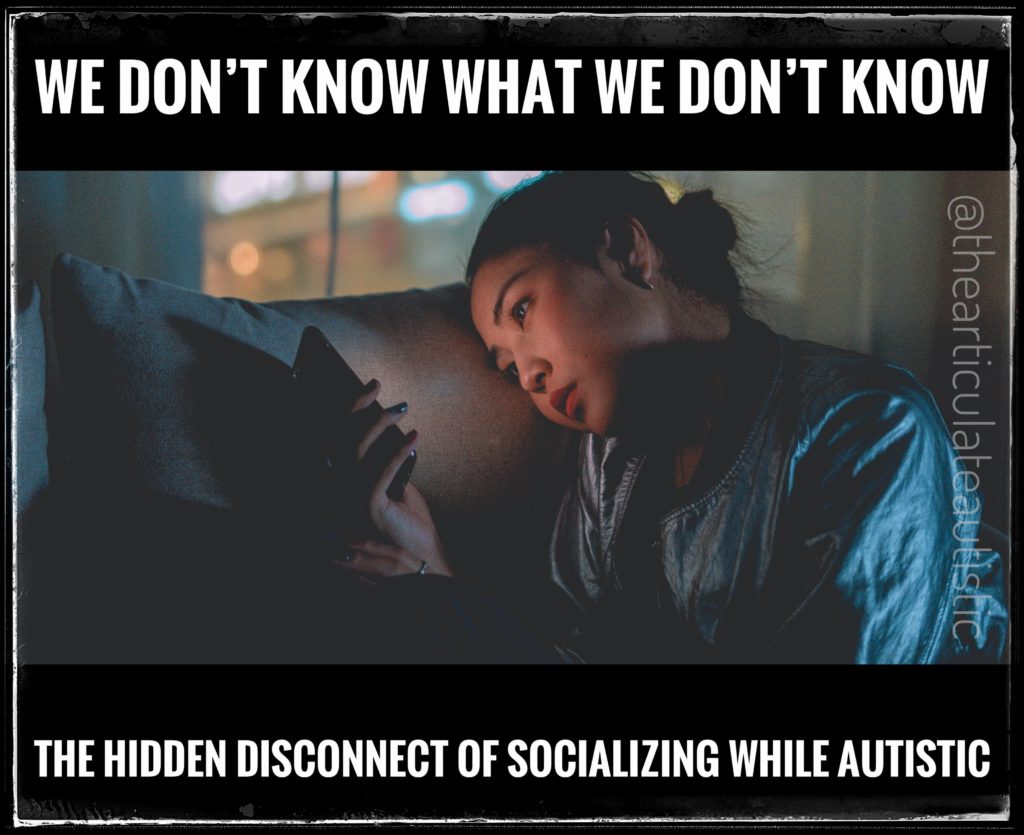We Don’t Know What We Don’t Know – The Hidden Disconnect of Socializing While Autistic

I’ve often heard that neurotypical people learn their social skills through interacting with other people. That it’s just something that happens automatically during time spent with their neurotypical family, friends, teachers, etc. I’m sure there is some trial and error involved, but, for the most part, at a certain age, neurotypical people just seem to–”get it” when it comes to knowing how to socialize with others without causing major and continued upheaval in their lives.
As an autistic person, I cannot fathom learning how to socialize from my environment because my brain is not designed that way. I don’t learn anything implicitly, I learn by being explicitly taught. This can cause a lot of problems socializing with neurotypicals because what they learn automatically, I cannot learn unless I’m taught.
If I offend someone, and I don’t know why, I will ask in earnest what I did, so I can avoid doing it in the future. Unfortunately, the neurotypical person will usually respond with even more offense than they started with and be appalled at the idea that 1) I truly didn’t know and 2) I’m asking them to explain.
Therefore, socializing with neurotypical people has always been, for me, like walking a tightrope where I’m on guard all the time, masking heavily, and exhausted afterward.
The Circular Nature of Socializing But Not Learning for the Autistic Person
When I was younger, this is how my attempts to socialize with neurotypical people would usually go:
I would meet a person, talk to them, get together with them, have some type of interaction that would leave me feeling vaguely uncomfortable and confused, repeat a few times, and then the person would disappear from my life. I would contact them to see what went wrong, and I would be met with either anger or complete silence.
See, when neurotypical people go into social situations when they’re younger and they are still figuring things out, they will make some social mistakes. However, they seem to learn from them through this trial-and-error process. Simply being in the social situation itself is enough to make them realize they made a mistake. They then learn from it, mature, and move forward.
When an autistic person goes into a social situation that goes badly, they usually don’t learn from it, mature, and move forward because their questions are not answered. They are given no explanation as to what’s wrong and are (usually) offered no second chances to redeem themselves. Or, perhaps worse, they are slowly “phased out” after repeated unfortunate social interactions even though they are not aware that anything is wrong in the dynamic until their friends ghost them completely.
This leads to years and even decades of the same pattern: Make a friend, spend time with new friend, insult new friend unknowingly, lose friend, ask questions, get no answers, retreat from the world, heal, venture back out to make a friend, etc. Rinse, repeat.
Eventually, after a lifetime of this happening, I did the only thing that I knew would preserve my rapidly-failing mental health and permanently broken heart: I took myself out of the equation. I stopped trying to make friends entirely. I retreated into my own world where I was safe and others were safe from me (even though I couldn’t imagine why they weren’t safe from me).
We Lose the Chance at Maturity Through Experience Without Trauma
I think that neurotypical people achieve maturity through their day-to-day experiences in life because they understand social nuance, context, facial expressions, body language, intentions, double meanings, etc. If they do make a mistake, they can easily apologize and move forward in a more informed way because they are able to take in the context cues around them and adjust accordingly.
I think that many autistic people achieve maturity through trauma. Deep, shatteringly painful events such as sudden friendship loss, sudden job loss, toxic relationships, relationship breakups, bullying, being emotionally or physically attacked, and/or being “called out” publicly on social media.
Because we are unable to see the subtle signs of something going wrong between ourselves and others, people take our non-response as not caring, instead of what it truly is; an inability to read social cues while also living in a world where people who do understand them will not explain them.
This is why, for many autistic people, learning doesn’t take place until there is an explosion of emotion, and everything comes suddenly crumbling down around us.
Explanation is a Necessary Accommodation for a Neurological Difference

While I believe in building a bridge between the neurotypes, I’ve always understood and related to other autistic people much better and feel safer in their company. Research has even shown that autistic people socialize quite well with other autistic people and neurotypical people socialize just fine with other neurotypical people. It’s when the two try to interact that things can become challenging.
However, total avoidance of neurotypical people just isn’t an option for most autistic people, nor should it remain the only safe option for us. Furthermore, autistic people have no choice but to work with and interact with neurotypical people at least some of the time, so there needs to be more understanding of our differences instead of automatic rejection.
If you are a neurotypical person who has an autistic person in your life, the best thing you can do for them is to explain, in detail, what it is that you viewed as offensive before completely writing them off, talking behind their back, calling them out publicly, or just disappearing from their life.
Explanation is accommodation. Just like glasses, a mobility aid, or a hearing aid, a clear, concise explanation of what happened, what was viewed as offensive, and what can be done to remedy the situation and keep it from happening in the future are all reasonable and required accommodations for someone with this neurological difference.
The Takeaway
Most autistic people do not learn social skills through socializing because our brains are not designed the way a neurotypical brain is. Therefore, we unintentionally push away the very people we are trying to form relationships with. Oftentimes, when we reach out, we end up accidentally hurting others and getting ourselves hurt in the process. When we genuinely ask for explanations as to why our friends no longer want us around, we are met with even more anger and rejection on top of the pain and confusion we already feel.
As a neurotypical person, explaining what you feel went wrong and what you were offended by and why (never skip the why, it is essential to our understanding), you are offering a needed accommodation to a person whose brain works differently from yours.
In my opinion, providing this accommodation is no different than raising the volume of your voice for someone who is hard of hearing or explicitly explaining the color of something to a colorblind person.
Important note to my fellow autistic folks: Compromise is important in any relationship, but you are ultimately the one who gets to choose the feedback you take in and what you discard. If making the changes requested of you results in harm to your mental health, it may be time to walk away from the relationship as it will become inauthentic and unhealthy.
Download a PDF of this article on Patreon by clicking here.





Very insightful and well written…thanks for this lovely post ….I think no matter how hard one tries to connect with neurotypical, it’s very exhausting and so etching goes wrong….I think it’s best to be friends with autistic and adhd people who feels the same way….what do u think ?
I really vibe with this post but as someone who, due to RSD and lifelong struggles with this, I can’t help having a quiet strop and unhelpful thoughts in my head to hear the explanation yet again on why I was wrong.
Maybe it’s ‘double-empathy fatigue’ but how do you continue to hear feedback in this area, with an open mind and heart, when that explaining, feedback, correction or whatever only goes one way? It’s not like we really have the leeway to explain to NTs, especially those who hold power over us, how harmful, inconsistent and poor at communicating they are.
I love the advice. I just can’t seem to adopt it without a stank attitude.
Thanks for all your terrific posts.
how come neurotypicals want go offend neurodivergent people but when we tell them we’re offended of what they did act all saint like not thinking they did wrong. Offending is way street. Neurodivergent can’t get offended but Neurotypicals can. Neurotypicals need check themselves.
Neurotypicals want to complain we don’t follow rules but they don’t follow rules sometimes no consequences to them not following the rules. But Neurodivergent get sometimes treated worse than Neurotypicals not following the rules.
THANK YOU! This is so relatable. On my blog I wrote a series about ableism and one of the entries was about accommodation— not just by teachers, etc, but by friends.
The problem is, even when you tell an autistic person why, you don’t get an apology (let alone them making an effort to not do it again), you instead receive a fusillade of rationalizations and justifications. After a few times of this, the NT either tells the autistic off or ghosts them, and no wonder.
The next time someone pulls you aside and tells you that what you said was hurtful or that something you did was inappropriate, DON’T ARGUE or make excuses. Say “Didn’t mean to cause a problem, sorry.” or something like that, and STOP IT.
When you say you receive a “fusillade of rationalizations and justifications”, what you’re experiencing from the autistic person is a show of empathy. They’re not actually making excuses or trying to shift blame. They are explaining, in literal language, with no ulterior motive, what their intentions actually were, which was not to hurt you. The explaining is an attempt to reduce your frustration, hurt, and anger. That is how the autistic brain works. They’re not attempting to argue. They are actually trying to fix the problem. Now, I understand that to the neurotypical brain, this doesn’t look like empathy, it looks like the opposite, but that’s the intention. What ends up happening when an autistic person simply agrees to stop doing the thing when they don’t understand what it is they actually did, one, it feels like lying, and many of us cannot cope with lying, and two, if the autistic person doesn’t understand why the thing they did or said is considered wrong, they likely will not remember not to say or do the thing again because there is no full intellectual understanding of what went wrong. There’s no connection. That’s why asking an autistic person to stop doing that, whatever that is, often doesn’t work because they simply do not know what they are supposed to stop, or if they know that, they don’t know the why behind it, and they fear they will forget or, and this can be even worse, they will apply the misunderstood “rule” you’ve given them to ALL situations, regardless of context because of their black-and-white, all-or-nothing thinking. For example, “Never interrupt me when I’m on the phone!” The autistic person might take this so literally that when there is an emergency in the house, they STILL will not interrupt you while you’re on the phone, and the emergency could get worse, but because they are so afraid of angering you and making a mistake, they will follow this rule of not interrupting you, and you will think they’re purposefully being “maliciously compliant” when they were just being literal, and you will get angry anyway, possibly far angrier than you would have if you’ve been interrupted. This is why explanations are so critical, both giving and receiving, to the autistic mind. Clear expectations and explanations of rules and when and how they change are absolutely critical for full understanding and effective communication.